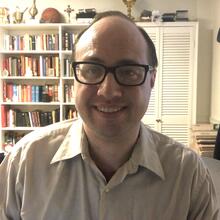Katherine Mangu-Ward is editor-in-chief of Reason, a libertarian political magazine of "free minds and free markets." An atheist, she earned a B.A. in philosophy and political science from Yale University and started at Reason as an intern in 2000 before serving as managing editor and becoming editor-in-chief earlier this summer. Her cover stories for the print magazine have included a defense of plastic bags, an argument against voting and a “welcome to our new robot overlords.”
Ms. Mangu-Ward has also worked at The Weekly Standard and The New York Times. She is a Future Tense Fellow at New America, a Washington think tank that emphasizes issues of the digital age. On July 5, I interviewed Ms. Mangu-Ward by email about libertarianism and religion.
You are the new editor of Reason, a monthly print magazine for political libertarians. What does libertarianism mean to you and why should ordinary Americans care about it?
I’d like to think Reason is a magazine for everyone—not just people who identify as libertarians! We’re staring down the barrel of an election season where both major party candidates are wildly unpopular and rather authoritarian, so libertarianism has become an even more relevant and appealing alternative than usual. The idea that we should let people make their own choices wherever possible—rather than letting the government make those choices for them—appeals to people across the spectrum. In general, people who are afraid “their team” is going to spend the next four or eight years out of power tend to be the most receptive to the idea of limited government.
What would you say to critics who dismiss libertarianism as a fringe ideology that does not represent most Americans?
Libertarian principles are built into the American experiment. Ideas of self-determination, religious toleration, skepticism about overweening government and economic freedom are very libertarian, and also very American. And with Libertarian Party presidential candidate Gary Johnson—an experienced governor from a purple state—pulling 8 percent to 10 percent in several national polls recently, I’d say more Americans than ever are willing to flirt with the label, too.
Because libertarians generally oppose laws regulating moral behavior on a variety of issues, ranging from drugs to the contraception mandate of Obamacare, religious critics sometimes accuse them of being amoral in their outlook on life. In what sense is this reputation deserved or undeserved?
There is certainly a variant of libertarianism that is genuinely amoral or at least relativistic. But most libertarians would draw a distinction between behaviors that are immoral and those that should be illegal, something liberals and conservatives consistently fail to do when it comes to their pet issues. (Liberals are happy for you to have sex with whomever you want, but God forbid you buy a Big Gulp or a gun. Flip that and you’ve got the conservative version.) Libertarians are looking for ways to clear space for people to behave in the ways that they deem moral by their own lights. We also want to make it safe for people to try to persuade each other that their vision of morality is the correct one. Prohibition of vice tends to generate more vice, rather than eradicate it. And virtue not freely chosen is (arguably) no virtue at all.
We are approaching an unusually divisive general election in November. How close are the Democratic and Republican parties to libertarian values at this moment in time?
Nowhere close. Democrat and Republican candidates rarely approach anything that resembles libertarianism, even in the best of times. And these are not the best of times.
Although some religious believers identify as libertarians, your magazine seems to attract a number of atheists and agnostics. How would you describe your own religious beliefs and what is your attitude toward organized religion?
My Reason deputy/right-hand man, Stephanie Slade, is an observant Catholic and has written eloquently about how her faith intersects with her politics. I strongly recommend her piece on being a pro-life libertarian, for instance, to your readers.
I’m an atheist, and on my father’s side I come from several generations of thoroughgoing skeptics about organized religion. It’s easy to be an atheist now, but it wasn’t always. And that’s precisely the reason libertarians can and should make common cause with religious folk: I want Catholics to be free to do their thing so that I can be free to do mine. Toleration is a two-way street, something that much of mainstream American politics fails to acknowledge.
From your perspective, how can Catholics and libertarians work together to make the world a better place?
By advocating for true toleration, libertarians and Catholics can both get what they want, freedom to live as they see fit. I would make a request to those advocating for conscience rights to think about the term in its broadest possible sense. Rather than engaging in special pleading for people of faith—as in the case of the Religious Freedom Restoration Act, Burwell v. Hobby Lobby and other similar efforts—why not look to extend protections for free speech and free association to all people, regardless of their motivations for wanting such things? There are many valid reasons to want to avoid economic coercion by the state, and not all of them are religious ones.
Many Catholics favor government limitations on human selfishness for a range of issues from abortion to ecology, with Pope Francis particularly forceful in his encyclical “Laudato Si’” on the economic exploitation by wealthy nations of natural resources in the developing world. To many Catholics who have worked or lived in Latin America, for example, it often seems like the United States enjoys a higher standard of living by virtue of the poverty and violence our policies create in other parts of the world. As a libertarian, how do you feel about this situation and what is your solution for it?
The greatest engines the world has ever known for lifting people out of poverty are open markets and free trade. That fact is something that Pope Francis, in particular, seems to undervalue as he lectures about the "culture of exclusion." I’ll direct your readers again to the work of my colleague, Stephanie Slade, who has written at length about “Laudato Si’” from a libertarian perspective.
If you could say one thing to Pope Francis about libertarianism, what would it be?
I would say the same thing to Pope Francis that I would say to the vast majority of the American left: If we truly want to help the “least of these,” we should buy the stuff they want to sell us, sell them stuff they want to buy and let them come and go across our borders as they please. And we shouldn’t presume to know what’s best for them—we should let people conduct their own economic affairs as they see fit.
Sean Salai, S.J., is a contributing writer at America.








Thanks for reading. You are certainly entitled to your personal opinions. Let's continue to pray for our nation.